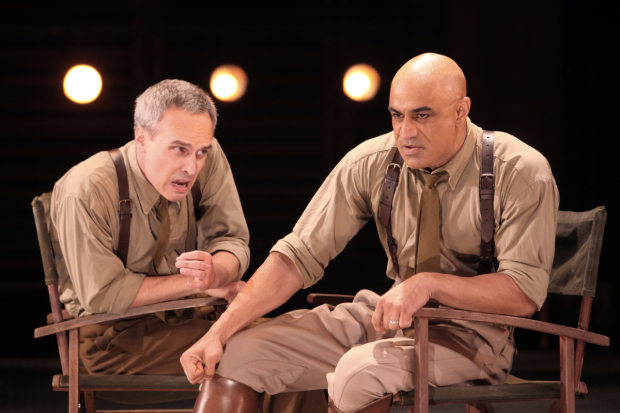Othello

(© Scott Suchman)
The Shakespeare Theatre Company brings back last season's production of Othello as this year's "Free for All," a program that offers free productions of Shakespeare's plays for two weeks each summer. Othello features one of Shakespeare's greatest tragic characters, a hero who foolishly allows himself to believe the lies of his corrupt, cruel, and jealous ensign, Iago. Ultimately, Othello's deception reveals how a world built on hatred, racism, and misogyny can destroy a world based on honor and devotion.
Othello opens on a street in Venice, where Iago and the gentleman Roderigo are discussing Iago's hatred for Othello and Roderigo's adoration for Othello's new bride, Desdemona. Together they alert Desdemona's father, Brabantio, that his daughter has run off with Othello. Brabantio believes that Othello must have used "spells and medicines" to get his daughter to elope. Othello, Desdemona, and Brabantio meet with the Duke of Venice, who hears Othello explain his the charms he used: "She loved me for the dangers I had passed / And I loved her that she did pity them / This only is the witchcraft I have used," swears Othello. In the story, Othello presents himself as a fulfilled man: a famous warrior, advantaged by a noble family; a man who has united East and West; a Muslim who has converted to Christianity in order to marry Desdemona; a man of action who has won the heart of a pure and good woman. He is a man to be honored by his soldiers, his society, and his family.
The Duke sees how such a life story might have bewitched his own daughter and dismisses Brabantio's fears. But Iago displays his total lack of soul when he tells the despairing Roderigo to wait for Desdemona until she tires of Othello, reminding himself of his heartfelt cause: "I hate the Moor." As the plot spins out some creaky old devices — a dropped handkerchief, an overheard conversation, a misunderstood reference — the play glides smoothly to an inevitable situation: Iago convinces Othello that Desdemona has been unfaithful to him with Cassio, Othello's beloved lieutenant.
Faran Tahir is superb as Othello, giving a muscular performance throughout the play, even when Iago begins to slither inside his brain, making Othello's body and speech fail him. That image of the complete man that Tahir creates early in the play is essential to how Iago chips away at Othello's glorious picture, inch by inch. Jay Whittaker is equally fine as Iago. Whittaker makes it clear that Iago's hate for the Moor stems from anger over not being promoted and the irrational fear that Othello may have slept with his wife.
Madeleine Rogers provides an excellent match for Othello. Rogers plays Desdemona as young, carefree, and profoundly devoted to her husband. Patrick Vaill strikes just the right notes as Cassio. Vaill is particularly good in the scene where he is dressed down by Othello for getting drunk. Iago's wife Emilia is portrayed beautifully by Pilar Witherspoon, who delivers some of the play's choicest philosophical notions about relations between men and women. Ben Diskant creates humor in the role of Roderigo by playing him as a buffoon.
Riccardo Hernandez's set has a rough-edged feel to it. The play space is a bare, concrete stage with five huge fans attached to the back wall. Industrial-style lights hang from the ceiling. Rusted oil drums stand everywhere. Costume designer Emily Rebholz dressed the soldiers and officers in standard post-World War I, tan and brown British uniforms. Ron Daniels has directed a sensitive and passionate production, making the play more than a vivid definition of tragedy and a conflict between two dramatic characters. In Daniels' hands, the play becomes an astonishing comment on how quickly a toxic atmosphere of falsehoods can surround and devour men and women of good will.










